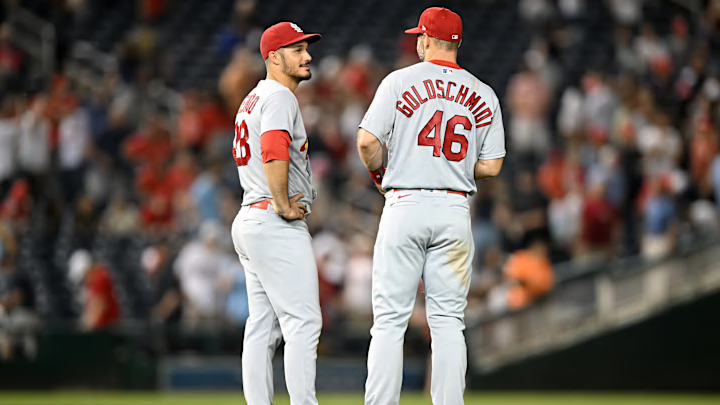There are three primary ways to build a Major League Baseball team: trades, drafting/developing, and free agency acquisitions. A couple of months back, I took a deep dive into the St. Louis Cardinals' recent drafting and development results. The Cardinals have accumulated as much WAR out of their homegrown players in the past decade as teams such as the Cleveland Guardians, Los Angeles Dodgers, Atlanta Braves, and Tampa Bay Rays. Additionally, the Cardinals have seen their own players receive national award recognition as rookies for many consecutive years.
Another facet of team development is trades. Robert Frey on X has been doing excellent work recently. He has been posting data that discusses team trade statistics in recent history. By using bWAR, Frey has been able to decipher which teams and front offices have been successful with trades recently and which have struggled. The first graph discusses the total bWAR lost or gained since 2019 in trades.
Some more offseason data, here's the bWAR gained or lost on trades since 2019. #Analytics pic.twitter.com/UCG9jvG50C
— Robert Frey (@RobertFrey40) November 2, 2023
The St. Louis Cardinals have lost 6.0 bWAR since 2019 in trades. That places them below the league average, but still near the middle of the pack. The Dodgers, Braves, and Astros have gained the most bWAR in trades since 2019 while the Athletics, Cubs, and Mets have lost the most bWAR in that same time period.
Since 2019, the Cardinals have traded away players such as Randy Arozarena, Carson Kelly, Harrison Bader, Adolis Garcia, Luke Weaver, and Jordan Montgomery most recently. The team has netted players such as Nolan Arenado and Paul Goldschmidt, but beyond those two, St. Louis has lost many of the trades. The negative bWAR value makes sense when put in perspective. While the Cardinals brought in two true superstars, the quantity of good talent they traded away has caught up with the limited greatness they brought in.
The second chart that Robert Frey posted deals more with the percentage of trades in which management had a positive WAR differential.
Here's another way to look at trades by GM's Hire Date.
— Robert Frey (@RobertFrey40) November 7, 2023
How many trades did they complete where the net WAR is above 0? While Preller may have an overall net gain per trade, his trades hit at a 40.8% rate.
Meanwhile, Alex Anthopoulos really might be him.#MLB #analytics pic.twitter.com/EYGm3DRQ56
Using this data, we can see how many trades John Mozeliak "won"-how many trades the Cardinals came out on top in using bWAR since his hiring. Mozeliak has broken even on trades since his hiring. Half of the trades he has made involved the team netting a positive WAR total while half had the team lose the WAR battle. Alex Anthopoulos, on the other hand, has had a positive WAR total in two-thirds of the trades he's made since he became the Braves' General Manager in 2017.
While the second chart could be biased toward buyers (typically, more veteran players will accumulate WAR immediately after the trade while younger prospects will not have accumulated any WAR for quite a while after the trade), it doesn't include any trades after the 2022 season.
The argument among St. Louis fans recently is that Mozeliak has "lost" every trade he's made. In reality, he has hit on exactly 50% of the trades he's made, a presumptive conclusion when considering the circumstances of trades. The Cardinals actually have a better "hit rate" on trades than 20 other teams in baseball. To be in the top third of baseball teams in trades is strong.
Mozeliak has been tenured as the General Manager or President of Baseball Operations since 2007, so he has had plenty of trades during this tenure, including the acquisitions of David Freese, Matt Holliday, Jason Heyward, Marcell Ozuna, Paul Goldschmidt, and Nolan Arenado. He has also traded away Stephen Piscotty, Tommy Pham, Scott Rolen, Luke Voit, Sandy Alcantara, Zac Gallen, and Adolis Garcia, among others.
Alternatively, the team has "lost" bWAR on trades since 2019. Recent trades haven't trended in the Cardinals' favor. Throughout Mozeliak's tenure, however, he has been a strong transactional General Manager when compared to his peers during their time as General Managers.
